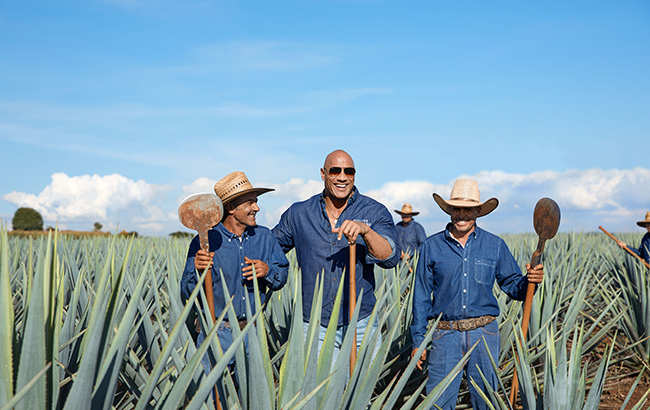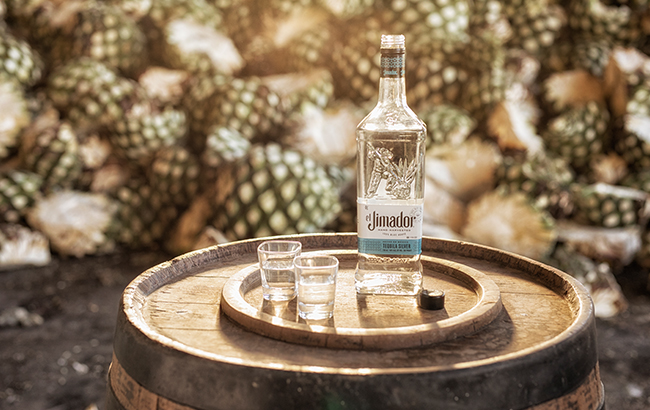Will celebrity-backed Tequila brands succeed?
Celebrities such as The Rock and George Clooney have helped the stratospheric rise in popularity of Tequila and other agave spirits. But canny consumers will discern whether the stars have a real passion for the spirit.

In 2013, actor George Clooney and his business partner, Rande Gerber, launched Casamigos, a 100% agave Tequila. The brand went on to sell 120,000 cases in 2016, and was subsequently snapped up by Diageo a year later in a deal that valued Casamigos at US$1 billion. Following the sale, Clooney topped Forbes’ list of highest‐paid actors after earning US$239 million before tax between 1 June 2017 and 1 June 2018.
Since Casamigos’ launch, the popularity of Tequila has rocketed, and sales have gone through the roof. According to IWSR Drinks Market Analysis, global Tequila volume sales had a compound annual growth rate (CAGR) of 5.3% between 2014 and 2019. The firm also predicts the category could increase by 4% CAGR to 2024. “Tequila was already growing before celebrities began to get involved – maybe that’s why so many celebrities decided to enter the category,” says Jaime Celorio, CEO of Ambhar Tequila.
CELEBRITY ACTIVITY
The sector has been a hotbed of celebrity activity in recent years, with numerous famous faces entering the world of agave spirits. The past year alone saw basketball player Lebron James invest in Lobos 1707 and Pretty Little Liars star Shay Mitchell launch a Tequila‐based drinks brand. Meanwhile, actor Pierce Brosnan joined Casa Don Ramón Tequila as global spokesperson, and Espanita Tequila named American rapper Pitbull as its strategic adviser and global brand ambassador.
One such brand to benefit from the influx of A‐listers was Ambhar Tequila. Launched in 2009, the brand found its moment in the limelight in 2018 after Sex and the City actor Chris Noth acquired a majority stake in the ultra‐premium Tequila. “Chris Noth discovered Ambhar Tequila through some mutual friends and he enjoyed it so much that we started talking,” says Celorio. “He was fascinated about our artisanal production process and we went through a number of tastings, and then we started discussing our future brand plans. Chris isn’t one of those celebrities who endorses everything, he only puts his name on something if he truly believes in it.”
Celorio says the brand’s association with Noth has helped raise its profile ahead of its debut in new markets, including Canada, parts of Europe, and Asia. According to Arturo Gajón Araujo, senior global brand manager for Tequilas at El Jimador owner Brown‐Forman, brand building such as this is a major draw of working with big‐name stars.
“What we’ve seen recently from celebrity spirits is that big companies are really interested in shortcuts to consumers,” he says. “Building a brand is tough and takes a long time, so when you have a personality that is known and recognised around the world, that’s a very valuable shortcut, and some spirits makers are willing to pay a lot of money for that.”

A star’s power to build hype around a new product and translate excitement into case sales was showcased in Teremana Tequila’s first year. The brand, which was launched in March 2020 by Fast & Furious actor Dwayne ‘The Rock’ Johnson, said in December 2020 that it was on track to sell 300,000 cases in its first 12 months.
“We have been blown away by the response from consumers, bartenders and retailers,” says Jenna Fagnan, co‐founder of Teremana Tequila. “We launched at the end of March 2020, right in the midst of shutdowns so we decided to do a quieter soft launch. However, with consumers at home engaging on social media and a new interest in at‐home cocktail making, the consumer was looking for brands that brought them great quality and value, and brands that they could trust.”
MILLIONS OF FOLLOWERS
Founded by Johnson and Fagnan, alongside Dany Garcia and Ken Austin, the brand was extensively teased ahead of its launch to Johnson’s 213m Instagram followers. The former wrestler offered fans a glimpse of his visits to the brand’s distillery in Mexico, his process tasting samples and even unveiled the bottle’s design on social media.
“Dwayne is the real deal,” says Fagnan. “He has been talking about Tequila for years, and the consumer saw the process along the way. This was not a fast‐to‐market product, but one worked on over time and done the right way. We partnered with one of the few remaining family‐owned distilleries in the highlands of Jalisco, and built our own distillery next to their larger one. This way we can ensure Teremana is crafted to our specific high‐quality standards and at the same time lean on the logistics and knowledge of a larger distillery, and collaborate with a family that is in this for the long term together with us.”
Teremana Tequila surpassing 300,000 cases in its first year is no mean feat, and Stephen Rannekleiv, global beverages sector strategist at Rabobank, says the perception of its founders and their commitment to its development built the brand’s authenticity in the eyes of drinkers.
“Some celebrities put in more effort and they are more invested in the brand than others, and what The Rock has done really raises the bar of how you do this,” he says. “But it can be a mixed bag when celebrities get involved. It depends on how they do it, how they invest behind it and what sort of credibility they have. Some perform better than others, and I think that depends on the celebrity themselves and where the category is in its life cycle.”
Fagnan adds: “Consumers are smart, and they know when a product is just a celebrity endorsement or if it is real and has roots and meaning to someone they respect.”
The integrity of stars such as Clooney and Johnson has aided their respective Tequila brands. But what impact have their launches had on the Tequila sector as a whole?
As Tequila targets premiumisation in markets such as the US, Michael Merolli, managing director of the House of Tequila at Pernod Ricard, believes such stars could prove to be a positive association for the wider category.
He says: “George Clooney is the most obvious one, and when you think about him you don’t see him in a nightclub dancing on top of tables. It’s more about enjoying life and enjoying good products. This is a very positive association that is also a way to demonstrate that Tequila is more sophisticated than maybe some people would think.”

POSITIVE PERFORMANCE
Rannekleiv also believes the credibility of stars such as Johnson and Clooney has created “a positive halo for the category”, which could aid the premiumisation of the sector. However, Araujo argues the sector was targeting premium drinkers before celebrities found an interest in Tequila. “The category has been premiumising for quite a while now. In the US you can go back 15 or 20 years, in Mexico there was a strong boom in the last decade,” he says. “That effect prevails, then celebrities saw an opportunity in a very young or undeveloped spirits category, and maybe some of them could see where this would go.” Michael Dean, president and owner of 100% agave Tequila brand Mi Rancho, agrees Tequila has found its own way. He says: “Tequila is no longer considered an inferior product by anyone and has come into its own as a luxury brand. It’s not so much about getting drunk with your buddies and studying for an exam. The inferiority of the product itself is going away because it has come to its own as a luxury product.”
FIRST TIMERS
Changing the perception of Tequila in the eyes of drinkers is one thing, converting that to case sales is another challenge entirely. With film stars and musicians now promoting agave spirits around the world, Araujo believes new drinkers could be encouraged to sample Tequila for the first time.
“Celebrities joining the category has definitely had a positive effect,” he says. “Consumers that would not have normally looked at this category have suddenly shown an interest and have been curious to try [Tequila]. Perhaps this has been through one of these brands launched by celebrities, or perhaps seeing why it is becoming the category for celebrities to play in.”
Rannekleiv agrees, and says: “Could celebrities attract people who don’t normally drink Tequila to give it a try? That’s quite possible. My daughter’s college roommate has an enormous cutout of The Rock in her room, and now my daughter says she has started drinking Tequila, so in that instance it might.”
With celebrity backing now behind multiple Tequilas, what can other brands do to compete with the purchasing power of The Rock’s millions of fans? For Pernod Ricard and its 100% agave Tequila brand, Altos, a focus on authenticity has formed the foundation of its efforts to attract new drinkers.
Merolli says: “It is not because celebrities are working that every brand has to get a celebrity. I think there is a space for differentiation and with Altos it is really about the authenticity. It’s a brand done by bartenders for bartenders and we want to stay true to who we are.”

HIGH-PROFILE BARTENDERS
Having been created by bartending duo Dré Masso and the late Henry Besant, Altos has chosen to work with high‐profile bartending talent, rather than celebrity brand ambassadors. Brown‐Forman, which also owns Tequila Herradura, has on occasion aligned itself with celebrities, and previously worked with Mexican actor and activist Cecilia Suárez on a campaign. Despite successes for the initiative, Araujo believes celebrity influence is more effective when a star is invested in the brand.
Araujo says: “I think celebrity brand ambassadors have been a common tool. We recently celebrated 150 years of Herradura and in Mexico partnered with a Mexican actress called Cecilia Suárez to be the spokesperson for our celebration. I think it’s great when you align with celebrities that match the values and personality of your brand and you can collaborate and amplify the voice of the brand. But I think the power of celebrity truly unleashes the most when it’s their brand.”
With new brands and drinkers entering the fray, there could be downsides to Tequila’s newfound fame. Strict rules around production mean that Tequila is at the mercy of the agave shortages that have plagued the industry in recent years, leading to higher prices for producers. As the sector’s popularity continues to climb, producers in Mexico will be feeling the pressure.
Ambhar’s Celorio says: “I love Tequila, that’s why I chose to get into this business, but as an industry we do need to be careful to ensure that all of the new products that are being developed – celebrity endorsement or not – are up to standard. I fear that some brands are cutting corners in their rush to introduce new products, and that doesn’t benefit anyone. At Ambhar, high quality and consistency will always be at the forefront of everything we do.”
But as we have seen in other categories such as gin, Tequila’s meteoric rise will look appealing to anyone looking to diversify their business portfolio, celebrity or not. However, ahead of any further Tequila launches from the world of entertainment, Merolli warns that shelf space may soon be limited.
“There is a big momentum, and this has been a way to put Tequila on the top of the agenda for consumers,” he says. “There are a lot of celebrities that have seen the successes of others and are trying the same thing. I don’t know if there will be space for all of them.”
